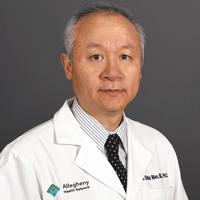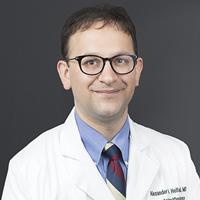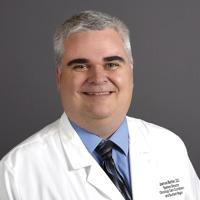Learn more about our appointment options, second opinions, locations, referrals, and resources that are at your disposal.

Urologic Oncology Center of Excellence
About the Urologic Oncology Center of Excellence
The Urologic Oncology Center of Excellence at AHN provides cutting-edge personalized care across the spectrum of genitourinary (the urinary and reproductive system) cancers. AHN has multiple experts in Urology, Medical Oncology, and Radiation Oncology specialized in treating cancers of the prostate, bladder, kidney, testicle, as well as other rare genitourinary tumors. We offer the latest in innovative technologies for robotic surgery, targeted radiation, and immunotherapy, along with a robust clinical trial portfolio. AHN offers precision medicine that delivers the right treatment at the right time, while still incorporating the compassionate and coordinated care you need during treatment.
From the initial moments of a cancer diagnosis to active treatment and survivorship care, AHN’s team of physicians, advanced practice providers (such as nurse practitioners and physician assistants), nurses, dietitians, genetic counselors, and social workers support each patient every step of the way.
At the Cancer Institute’s Urologic Oncology Center of Excellence, we offer some of the most-advanced care — including complex robotic surgery, urinary reconstruction, pinpoint accurate radiation therapy, radioligand therapy, targeted therapy, and immunotherapy.
Our experienced team of genitourinary cancer specialists includes:
- Urologic surgeons
- Medical oncologists
- Radiation oncologists
- Genetic counselors
- Pathologists
- Radiologists
- Nuclear medicine physicians
- Nurse navigators
- Physical therapists
- Occupational therapists
- Social workers
-
Appointments
Cancer Institute(412) 578-HOPE
The Urologic Oncology Center of Excellence provides patients with diagnoses, innovative treatments, and access to ongoing clinical trials.
We use innovative techniques to help treat genitourinary cancers, such as:
- Robotic surgery: Our surgeons use robotic surgical technology to perform intricate procedures with more precision and control than traditional techniques.
- Minimally invasive procedures: Many of our patients receive treatment without a surgical incision such as cryotherapy and high intensity ultrasound. These types of procedures can result in a quicker, more comfortable recovery.
- MR-Linac specialized radiation: AHN is one of a small number of institutions in the United States using MR-Linac technology, along with stereotactic radiosurgery, to reduce the number of radiation treatments and side effects.
- Radioligand therapy (RLT): This treatment with PLUVICTO*® is an innovative type of nuclear medicine that works throughout the body for certain advanced prostate cancer patients.
- Latest medications: We use immunotherapy and targeted therapy, which is personalized to the genetic makeup of the patient’s cancer.
- Precision medicine: Our teams use state-of-the-art genomic testing of patients’ tumors and blood to identify cancer-related genetic mutations and personalize cancer treatment.
The country's leading cancer organizations have recognized the AHN Cancer Institute for our high-quality care, research, clinical trials, and positive outcomes. Many prestigious organizations have acknowledged us including:
- The American College of Surgeons Commission on Cancer who recognize us as an Integrated Network Cancer Program.
- The American College of Radiology who recognized us as a Diagnostic Imaging Center of Excellence.
- The American Society for Radiation Oncology.
- The American Society of Clinical Oncology** who recognized us as Quality Oncology Practice Initiative (QOPI®) Certified.
Innovative, personalized genitourinary cancer care
At the AHN Urologic Oncology Center of Excellence, we work with you to tailor a comprehensive treatment plan that meets your specific needs. Your team of specialists may use a single type of treatment or a combination of therapies to give you the best results possible.
Prostate Cancer Center
At our Prostate Cancer Center Patients can see multiple specialists in one visit to discuss potential treatment options for their prostate cancer, including active surveillance, robotic surgery, radiation, brachytherapy, cryotherapy, and the Prostate Cancer Center’s high-frequency ultrasound treatment.
Support services
Support for your whole health is crucial during cancer treatment. From mental to emotional to physical support, AHN also provides additional services for cancer patients that support you during and after treatment. These support services include pain management and palliative care that will help you manage the side effects of treatment. Additional support services include the AHN Cancer Navigation Team, genetic testing and counseling, rehabilitation through Oncology Rehabilitation, and a patient ambassador program.
Cancer-risk assessment
We will assess whether you may have a hereditary genetic mutation related to your cancer and work with Genetics Services to help you and your family members avoid cancer and detect cancer at earlier stages in the future.
Nutritional health
Our patients work closely with our Oncology Dietitians to make a personalized plan to optimize nutrition throughout the cancer journey. Learn more about how AHN dietitians can help in your cancer treatment plan.
Exercise Oncology
Our Exercise Oncology and Resiliency Center provides “exercise as medicine,” with a training plan personalized to each patient. The center aims to decrease treatment side effects, improve quality of life, and help produce better medical outcomes.
PLUVICTO® is a registered trademark of the Novartis Pharmaceuticals Corporation.
Quality Oncology Practice Initiative (QOPI®) is a registered trademark of the American Society of Clinical Oncology.
Genitourinary cancer care
The AHN Urologic Oncology Center of Excellence offers comprehensive genitourinary cancer care delivered by highly skilled experts who understand the complexities of these cancers and their recovery and rehabilitation. The Center of Excellence uses a multidisciplinary approach to care to ensure your whole health is considered when receiving treatment. AHN providers are board-certified urology physicians who are well-versed in health issues affecting the genitourinary systems.
Prostate cancer
Prostate cancer is one of the most common cancers among people assigned male at birth and who are over the age of 60. It’s also one of the most successfully treated types of cancers. Prostate cancer treatment may include:
- Surgery: A urologist (surgeon) will remove the prostate during a prostatectomy and may remove some of the lymph nodes in the pelvis. Other types of treatment include cryotherapy and high-frequency ultrasound treatment.
- Radiation: A radiation oncologist will design a plan to deliver targeted radiation to the prostate.
- Hormone therapy: A urologist or medical oncologist may give treatments to block testosterone and stop prostate cancer from growing.
- Chemotherapy: A medical oncologist may give intravenous or oral medications to help control prostate cancer when it has spread to other parts of the body.
- Active surveillance: In certain patients with prostate cancer at low risk of growing or spreading, a urologist will closely monitor with blood tests and prostate biopsies instead of treating the cancer right away.
Bladder cancer
Bladder cancer, which forms in the bladder's tissues, is more common in those assigned male at birth and generally affects those over the age of 55. While it is less common than some other cancers, it still represents a significant health concern, especially if it is found in later stages. Treatment success varies widely depending on the stage at diagnosis, with early detection crucial for favorable outcomes. Treatment options available at AHN include:
- Local treatment: Local treatment for bladder cancer primarily involves transurethral resection of the bladder tumor (TURBT) to remove visible cancer, often followed by intravesical therapy (instilling medication directly into the bladder) to destroy any remaining microscopic cancer cells.
- Intravesical treatment: A urologist gives immunotherapy or chemotherapy drugs inside the bladder to try to stop the cancer from coming back.
- Surgery: Surgical options for bladder cancer range from minimally invasive treatments to a partial or a full cystectomy (removal of some or all of the bladder) as well as removal of the pelvic lymph nodes or reconstruction of the urinary system.
- Radiation: A radiation oncologist will design a plan to deliver targeted radiation to the bladder and a medical oncologist will give chemotherapy while the patient is receiving radiation.
- Immunotherapy and chemotherapy: A medical oncologist may give intravenous or oral medications to help prevent the cancer from coming back or stop the cancer from growing.
Kidney cancer
The AHN Urologic Oncology Center of Excellence treats kidney cancer with advanced care options and state-of-the-art technology. Kidney cancer treatment may include:
- Surgery: A urologist (surgeon) will remove part of or all of the kidney in a nephrectomy procedure.
- Radiation: A radiation oncologist will design a plan to deliver targeted radiation to certain small kidney tumors.
- Immunotherapy and targeted therapy: A medical oncologist may give intravenous or oral medications to help prevent the cancer from coming back or stop the cancer from growing.
Testicular cancer
Testicular cancer develops from cells within the testicles. Most cases arise from germ cells, which are responsible for producing sperm. There are several types of testicular cancer, categorized by the type of cell they originate from, including seminomas and non-seminomas. These types have different characteristics and respond to treatment differently. Testicular cancer treatment may include:
- Surgery: A urologist (surgeon) will remove the testicle. Sometimes they will remove lymph nodes in the abdomen as well.
- Radiation: A radiation oncologist will design a plan to deliver targeted radiation to the lymph nodes in the abdomen.
- Chemotherapy: A medical oncologist will give several weeks of chemotherapy in order to stop the cancer from growing and prevent it from coming back.
Rare genitourinary cancers
Our genitourinary cancer experts are also experienced in treating rare genitourinary cancers, including cancers of the penis, scrotum, urachus, and adrenal gland, using a combination of surgery, radiation, and chemotherapy to achieve the best outcomes for each patient.
Urologic oncology specialists
At the AHN Cancer Institute, our team of urologic cancer specialists is ready to provide the most effective treatments with compassionate and comprehensive care, should you or someone close to you ever need it.
The team meets regularly to discuss and confirm the right combination of therapies for a patient. We work with you to get an accurate diagnosis and to create an effective strategy for your treatment.

Chairperson/Clinical Trials Lead

Surgical Lead

Medical Oncology Lead

Radiation Oncology Lead

Nurse Navigator
How to get care
Call (412) 578-HOPE (412) 578-4673 to schedule an appointment at any location within the Allegheny Health Network Cancer Institute or connect with a nurse navigator.
What to expect from your first appointment
Your nurse navigator and support professionals will guide you through the process, and doctors will explain everything and answer any questions you or your loved ones have.
Clinical trials and research
The AHN Cancer Institute is a pioneer in cancer research and participates in clinical trials of new medical oncology therapies that are open for patients who qualify and wish to participate. Patients are screened for consideration with ongoing clinical trials at every stage of their treatment.
What is a clinical trial?
Clinical trials are studies that try to answer questions about new ways to treat cancer with medications, radiation, or surgical techniques. Previous trials have shown how new methods of treatment improve survival and quality of life and reduce the risk of cancer returning.
You participate in a clinical trial only if you volunteer to do so and meet criteria for inclusion in the study, and you can stop participating in a trial at any time.
Who can join a clinical trial?
The plan for the trial, called a protocol, explains what the trial will do and how the study will be done. Based on the questions the research is trying to answer, each clinical trial protocol outlines specific criteria necessary to be eligible to join the trial.
Common criteria for entering a trial are:
- Having a certain type or stage of cancer.
- Having received a certain kind of therapy in the past.
- Being in a certain age group.
Federal rules help ensure that clinical trials are run in an ethical manner, with your rights and safety protected. It’s to ensure that you’re not put at increased risk by participating in the trial, and that the results of the study are accurate and meaningful.
Conducting clinical trials helps us contribute to Cancer Moonshot — an initiative created by former President Joe Biden and the White House. The goal is to prevent more than 4 million cancer deaths by 2047 and improve the experience for people affected by cancer. We’re doing our part to join this fight by collaborating with more than 60 private companies, patient groups, academic institutions, and nonprofits.
Currently active cancer clinical trials
If you would like to participate in a clinical trial and help our innovative team discover groundbreaking cancer solutions, ask your doctor if you’re eligible to participate in one. Find urothelial, bladder, renal, kidney, or prostate cancer clinical trials open for participation.
Refer your patient to an AHN specialist
There are two ways for medical professionals, who are not a part of Allegheny Health Network, to refer their patients to an AHN specialist and request their first appointment. You can:
- Call (412) 578-HOPE (412) 578-4673 to speak with an AHN Cancer Institute scheduling coordinator.
- Go to Find Care to find the right AHN specialist and the most convenient location. Then refer your patient, provide relevant patient details, and request an appointment directly from the doctor’s profile.
For more information about referring your patient to an AHN specialist, read the Independent Physician Referral FAQs.
After referring your patient
Once your patient is receiving care from an AHN specialist, you can view their test results, see their treatment plan, follow their treatment progress, and collaborate with our team using the EpicCare® Link™ platform.
If you are new to EpicCare Link, or need to request your own EpicCare Link account, read: EpicCare Link for Patient Follow-up, for user instructions and new account request forms.
When EpicCare Link is not an option for a patient's AHN medical records
If you can’t access your patient's AHN test results through the EpicCare Link platform, your patient will need to complete and submit the correct AHN Medical Records Release form, based on their state of residency. Support your patient’s request by downloading the correct medical records release form for them:
EpicCare® is a registered trademark of Epic Systems Corporation and used with permission.
EpicCare® Link™ is a trademark of Epic Systems Corporation and used with permission.

